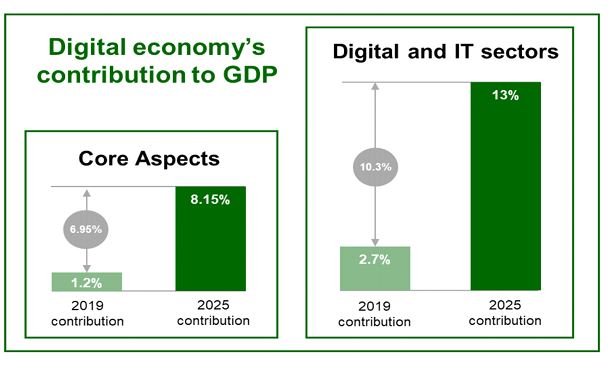INP-WealthPk
Aitizaz Hassan
The scale of digital economy will expand sharply in the next five years as the integration of digital technologies deepens in Pakistan, say official documents of the Ministry of Information Technology and Telecommunication (MoITT) available with WealthPK. The contribution of digital economy to GDP will continue to grow. From 2019 to 2025, the contribution of information communication and technology (ICT) core industry to GDP will increase from 1.2% to 8.15%, while the contribution of digital and IT sectors to GDP will increase from 2.7% to 13%.

The MOITT documents say the government operations are integrated and run as a single entity to provide services to all citizens without physical and geographic limitations, which increases efficiency and transparency. Inter-agency data is integrated on a government data platform, sharing digital resources with maximum efficiency.
Compared to the rest of the services sector, the IT Industry is the largest net services exporter with exports to 169 countries. The ICT exports, including telecommunication, computer and information services, surged to $2.616 billion in Financial Year 2021-22, up by 24.1% compared to $2.108 billion in 2020-21, according to a statement issued by the IT ministry.
According to a Huawei study, global modern ICTs will contribute to a digital economy valuing $23 trillion in 2025. It is predicted that there will be 100 billion connections by 2025, helping to drive digital transformation in domains including public utilities, transportation, manufacturing, healthcare, agriculture, and finance.
“By that time, 85% of enterprise applications will be on cloud, 86% of global companies will adopt artificial intelligence (AI), and data utilization rates will skyrocket to 80 %. This means 180 billion terabytes of data will be generated every year, which in turn will act as a constant source of innovative intelligence and value creation,” says the study.
ICT infrastructure and services are the foundation for countries to develop a digital economy and increase their overall economic well-being and competitiveness. They can help reduce poverty and hunger, boost health, create new jobs, mitigate climate change, improve energy efficiency, and make cities and communities sustainable.
The Global System for Mobile Communications (GSMA) projected that more than 50% of users will have a 4G connection in Pakistan by 2022. These projections are accurate; however, this remains three years later than the trajectory of global average.
Compared with the world average, the percentage of 4G connection in Pakistan is significantly smaller than the rest of the region, but is expected to grow at a faster pace and continue to grow beyond 2023. 5G is projected to pick up from 2023, but continue to account for a very small proportion of connections in the following years.
Credit: Independent News Pakistan-WealthPk



